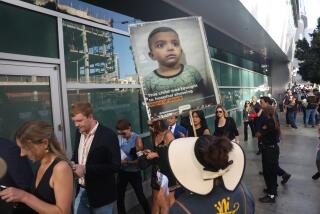After Zimmerman verdict, eyes turn to Florida and California
- Share via
It’s one debate with two faces: Sporadic demonstrations over George Zimmerman’s acquittal continued all over the country Tuesday, but two states, on opposite ends of the U.S., have made themselves the focus of the protests, and they’ve done so by taking divergent paths.
In Florida, it’s high-wattage activism. Orlando has arguably become the nation’s capital of racial discussion and new political pressure, with an NAACP convention bringing big names to discuss the aftermath of Trayvon Martin’s death and the prospect of formal political action.
U.S. Atty. Gen. Eric H. Holder Jr., in a Tuesday speech to the NAACP, called for a “respectful, responsible dialogue on issues of justice and equality” and an end to “stand your ground” laws.
“We must not fail to seize this chance to improve the nation we cherish,” Holder said, adding, “We must stand our ground,” which drew applause.
The high-profile calls for change are likely to continue. Al Sharpton, Jesse Jackson and Martin Luther King III were scheduled to speak at the convention Wednesday, and a march through Orlando was expected to take place after the speeches.
Holder’s message was already being spoken in Tallahassee, the state capital. Dozens of demonstrators occupied Republican Gov. Rick Scott’s office to demand a special legislative session to remove Florida’s “stand your ground” law, which they called “vigilantism.”
Passed by the Legislature in 2005, the law grants immunity to civilians who use deadly force if they have a reasonable fear of imminent death or great bodily injury. Under the law, a judge holds a hearing and can throw out a case before trial if he or she thinks “stand your ground” applies.
“By allowing and perhaps encouraging violent situations to escalate in public, such laws undermine public safety,” Holder said. “The list of resulting tragedies is long and - unfortunately - has victimized too many who are innocent.”
But if the Florida law presents a political bottleneck on which demonstrators and officials in the state can apply pressure, California has no such law on which demonstrators might fix their sights.
Though demonstrations over the Zimmerman verdict have been mostly peaceful across the U.S., California has stood apart, marked by violence in Los Angeles and Oakland, where officials’ and activists’ patience were diminishing.
“The purpose of the rallies, No. 1, was to give the community a safe space, a safe place, which is Leimert Park for black L.A., to vent their anger and frustration and come together as a community to give each other emotional support,” said Najee Ali, a Los Angeles activist.
But after an hour of demonstrating Monday evening, the event was “sabotaged,” Ali said, and a “flash mob” of young people congregated nearby.
Officials said a group of about 150 people splintered off and headed down Crenshaw Boulevard and neighboring streets, smashing windows, lighting fireworks and surrounding cars.
In Oakland, a protest Monday dissolved into window-smashing and anomie, with one restaurant reporting that a server was hit in the head by a hammer when he tried to prevent a protester from breaking a window.
“I saw the crowd out there last night,” Oakland developer Phil Tagami told the Oakland Tribune. “When people are smashing out the windows of Youth Radio, that’s clearly someone who isn’t from Oakland, or even about what the issue is. They’re anarchists. These are local businesses with local owners with local employees. These are not chained businesses. I don’t get it.”
Cuauhtemoc Negrete, 22, who was at the rally in Leimert Park, said he later was robbed and threatened by one of the rogue groups. He said he also saw people assaulted as they waited for a bus at Vernon Avenue and Crenshaw Boulevard.
Negrete broke down in tears as he expressed frustration over the protests. “Why does it always have to go down this road?” he said.
“I’ve been here awhile and I know them people will shut down this part of the city in a moment’s notice,” Moejo Ellis, 60, said as he recalled the 1992 civil unrest over the beating of Rodney King and the 1965 Watts riots. “I’m preparing for whatever. We are doing preventive maintenance for my family.”
Ellis said he didn’t condone violence but understood the restlessness that black youth might feel.
“They are used to things happening fast,” Ellis said. “The generation came up with computers [and social media] where things happen,” then he snapped his fingers. “Now they’re wondering, why is it taking so long to get justice?”
And the rest of Los Angeles is left wondering whether the south side will return to the nation’s headlines for a third bout of discord Tuesday night. Ali, the Los Angeles activist, said he planned to cancel further rallies “in the interest of safety.” And the Los Angeles Police Department appears to have lost its patience.
At a weekly Police Commission meeting Tuesday, Police Chief Charlie Beck promised a large deployment of officers in Leimert Park and said the department would be “very aggressive.”
“When crowds obey the lawful orders of police ... we allow them a lot of leeway,” Beck said. “Unfortunately, we won’t be able to do that tonight.”
Times staff writers Molly Hennessy-Fiske in Orlando and Emily Foxhall, Angel Jennings, Kate Mather, Joel Rubin and Ruben Vives in Los Angeles contributed to this report.
ALSO:
Zimmerman juror wins, loses book deal all in a day
For Sanford’s Chief Cecil Smith, it’s talk the talk, walk the walk
Peace, and more chaos, at Trayvon Martin rallies across the U.S.
More to Read
Sign up for Essential California
The most important California stories and recommendations in your inbox every morning.
You may occasionally receive promotional content from the Los Angeles Times.











